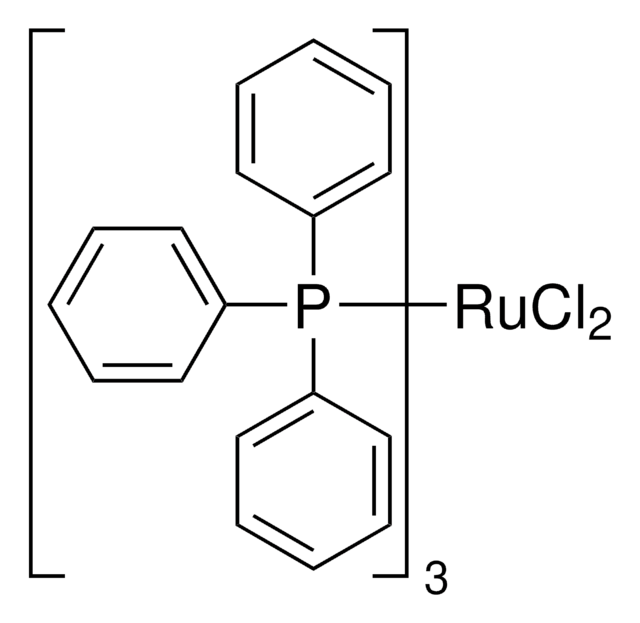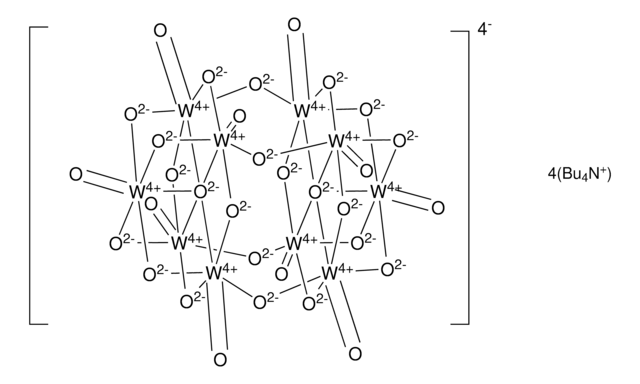224758
Tris(2,2′-bipyridyl)dichlororuthenium(II) hexahydrate
powder
Synonym(s):
Ru(BPY)3, Ruthenium-tris(2,2′-bipyridyl) dichloride, Tris(2,2′-bipyridyl)ruthenium(II) chloride hexahydrate
About This Item
Recommended Products
form
powder
Quality Level
reaction suitability
core: ruthenium
reaction type: Photocatalysis
reagent type: catalyst
mp
>300 °C (lit.)
photocatalyst activation
450 nm
SMILES string
[H]O[H].[H]O[H].[H]O[H].[H]O[H].[H]O[H].[H]O[H].Cl[Ru]Cl.c1ccc(nc1)-c2ccccn2.c3ccc(nc3)-c4ccccn4.c5ccc(nc5)-c6ccccn6
InChI
1S/3C10H8N2.2ClH.6H2O.Ru/c3*1-3-7-11-9(5-1)10-6-2-4-8-12-10;;;;;;;;;/h3*1-8H;2*1H;6*1H2;/q;;;;;;;;;;;+2/p-2
InChI key
WHELTKFSBJNBMQ-UHFFFAOYSA-L
Looking for similar products? Visit Product Comparison Guide
General description
Application
- Used in the synthesis of hybrid catalysts which are used in oxidase based biosensors.
- Used as a luminophore for multiplexed signalling in bio analysis.
- Used in oxygen assesment in living cells.
Product can be used with our line of photoreactors: Including Penn PhD (Z744035) & SynLED 2.0 (Z744080)
related product
Storage Class Code
11 - Combustible Solids
WGK
WGK 3
Flash Point(F)
Not applicable
Flash Point(C)
Not applicable
Personal Protective Equipment
Regulatory Listings
Regulatory Listings are mainly provided for chemical products. Only limited information can be provided here for non-chemical products. No entry means none of the components are listed. It is the user’s obligation to ensure the safe and legal use of the product.
JAN Code
224758-1G:
224758-VAR:
224758-250MG:
224758-BULK:
224758-5G:
Choose from one of the most recent versions:
Already Own This Product?
Find documentation for the products that you have recently purchased in the Document Library.
Customers Also Viewed
Electrogenerated Chemiluminescence Sensing
Our team of scientists has experience in all areas of research including Life Science, Material Science, Chemical Synthesis, Chromatography, Analytical and many others.
Contact Technical Service




![[Ru(phen)3]Cl2 ≥95%](/deepweb/assets/sigmaaldrich/product/structures/955/596/46f63eaa-39f8-4058-847d-cef0862ada92/640/46f63eaa-39f8-4058-847d-cef0862ada92.png)
2 ≥95%](/deepweb/assets/sigmaaldrich/product/structures/190/371/c5efe61d-383f-4364-90c6-1912d88674f3/640/c5efe61d-383f-4364-90c6-1912d88674f3.png)

![[Ru(bpz)3][PF6]2 95%](/deepweb/assets/sigmaaldrich/product/structures/317/925/f0ef928e-bbea-4535-abe6-dda0bc28d32a/640/f0ef928e-bbea-4535-abe6-dda0bc28d32a.png)


![[Ir(dtbbpy)(ppy)2]PF6](/deepweb/assets/sigmaaldrich/product/structures/158/329/2544d673-d267-4aa1-8f46-2652aad4bfa0/640/2544d673-d267-4aa1-8f46-2652aad4bfa0.png)
2 ≥95%](/deepweb/assets/sigmaaldrich/product/structures/238/198/d2398f4d-117e-4482-8d8b-80ae657f6ea1/640/d2398f4d-117e-4482-8d8b-80ae657f6ea1.png)